U.S. and International Strategy
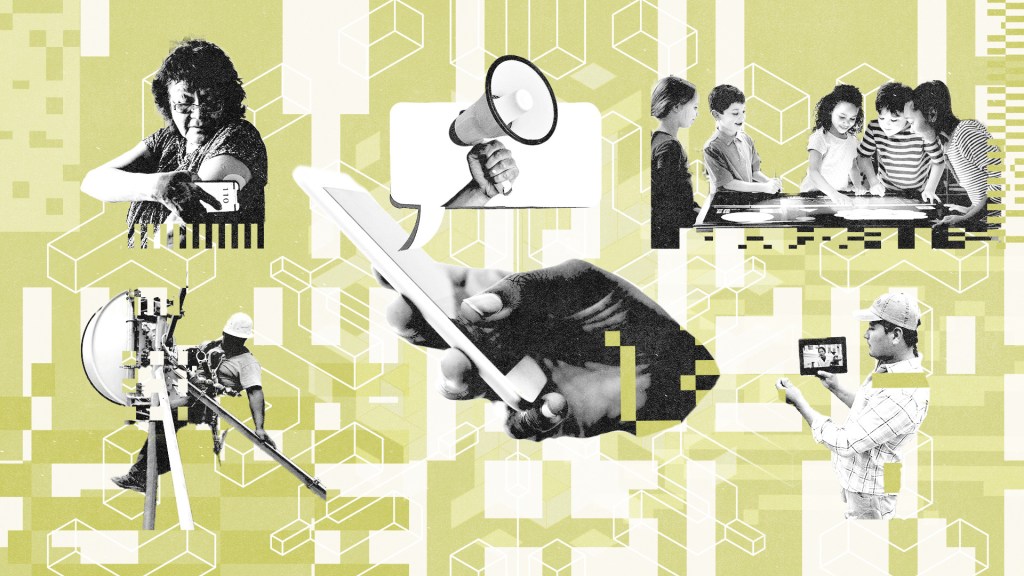
Though technology impacts nearly all aspects of modern life, its benefits are not evenly distributed. A handful of corporations hold extraordinary power gained through widespread data collection, control of communication platforms and services used by billions of people, and limited competitive and regulatory pressure. This power, along with both government and private sector surveillance, threatens civil and human rights. The Technology and Society program works to reshape technology systems and governance to shift power and advance social justice. We invest in ideas, individuals, and institutions that ensure that the internet and digital technologies become more equitable and are designed and governed to advance social and economic justice, particularly for people who experience persistent discrimination.
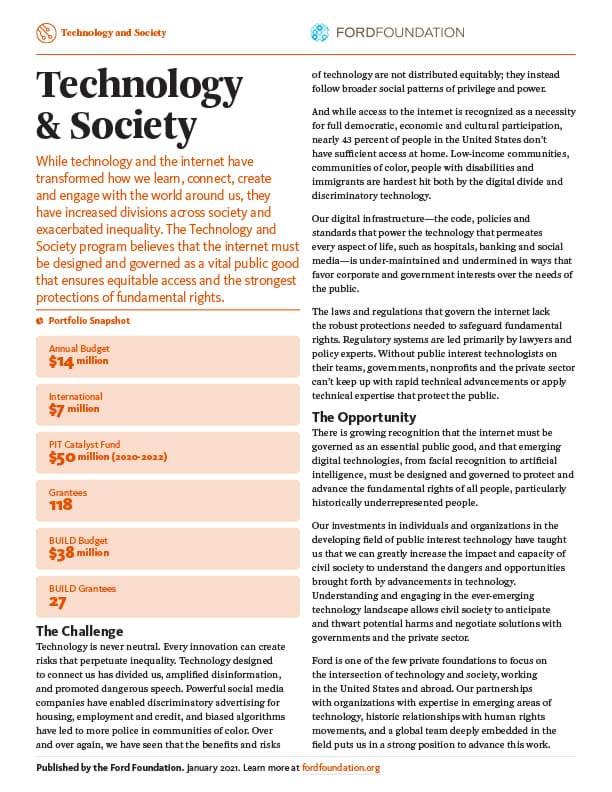
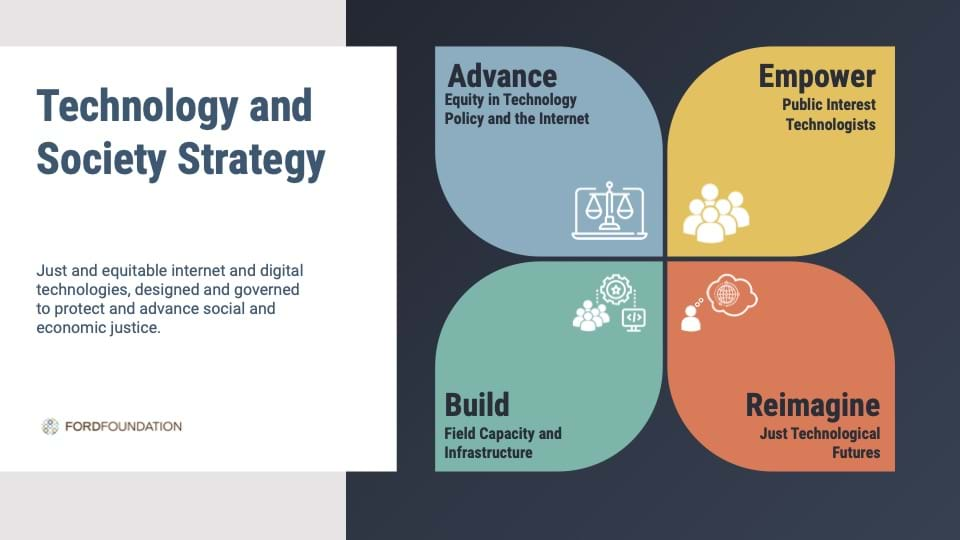
The Challenge
Decades before the internet became a pillar of everyday life, many believed that technological progress would accelerate equity and freedom. Technology was expected to vanquish entrenched gatekeepers, empower individuals, and eliminate human bias.
This has not been the reality. At present, the internet—and, more broadly, digital technology—poses significant threats to democracy and human rights, even as it has become essential for expanding access to information, enabling community-building, and increasing economic opportunity. Communities that have been historically excluded are disproportionately impacted by technology’s harms and are underserved by its benefits.
An extractive, data-driven online economy has created widespread individual and social harms, from amplifying disinformation to facilitating widespread surveillance and targeted discrimination. Private control of digital infrastructure remains unchecked by weak regulations, laws, and governance systems. Technical systems, including predictive and generative artificial intelligence, are infused with human bias that widens inequality in education, housing, health, employment, public benefits, the criminal legal system and more. Too often, technology exacerbates rather than dismantles systems of oppression that threaten the lives and prosperity of excluded and targeted communities around the world.
The Opportunity
The internet and digital technologies must be equitable and accessible, and they must be designed and governed to protect and advance civil and human rights. This requires effectively and consistently enforcing policies that promote competition, protect privacy, eliminate algorithmic harms, and promote digital equity. Global leaders must advocate for secure and sustainable internet infrastructure with technical standards and safeguards to bolster cybersecurity and safeguard human rights.
Over the past decade, Ford’s investments in public interest technology have demonstrated that technologists with a broad range of expertise—from computer science to law to social science—can mitigate and prevent these uneven benefits and harmful impacts.
Public interest technology spans sectors, from government to academia, from civil society to the private sector, and ensures that the perspectives of communities historically impacted by technology are reflected in its development and governance.
Ford was one of the first private foundations to focus on the intersection of technology and society. Our early commitment to this field, our partnership with organizations with expertise in emerging areas of technology, our historic relationship with social movements, and our global team have helped illuminate the ways that emerging technologies pose urgent human rights challenges.
Our Aim and Approach
We work to ensure that the internet and digital technologies are designed and governed to advance social and economic justice, particularly for those experiencing persistent discrimination. We work in the United States and globally with a focus on regions where Ford has an existing presence. By fostering collaboration among technologists and social justice organizations, we help ensure that technology advances rather than undermines equality. More specifically, we work to:
Build field capacity and infrastructure
We help build a more diverse, resilient, and inclusive technology rights field by prioritizing multi-year general support for organizations that center social justice. We support individual leadership capacity, strengthen a diverse pipeline of emerging leaders, build networks across the field, promote the ability to engage with a rapidly evolving issue landscape, and provide professional development opportunities. We prioritize organizations that bring an intersectional, feminist approach to their work, as well as ones that focus on the critical intersections of technology, disability inclusion, and gender equity.
Empower public interest technologists
We strengthen the public interest technology field by investing in fundamental technology rights and justice organizations that provide essential expertise to broader social justice movements. We also cultivate the emerging pipeline for public interest technologists who blend diverse technical expertise and social justice values.
Increase donor collaboration and coordination
We recognize that the Ford Foundation cannot bring about change on its own. We work with a range of other funders, particularly those with complementary funding strategies, on public interest technology and other issues, including economic justice and environmental protection. We also encourage and support other donors to engage in inclusive technology rights and justice grantmaking.
Advance affirmative visions
We invest in people and organizations that develop new narratives and technology designs that are grounded in social, political, and economic justice. We also provide support for advocacy, research, and organizing to advance public interest technology policies and designs that are grounded in justice and equity.
Our Impact
Our aim is for technology and the internet to become widely accepted as a vital public good that must be effectively regulated. This will result in more equitable access and better protections through enforceable rules and norms to guard against discrimination, censorship and surveillance. These efforts will be supported by diverse technologists who advance free expression, privacy, and equity in the development, deployment and governance of tech. To make that future possible, we work toward four outcomes:
Equitable and secure technology policy and infrastructure
Key public and private actors establish and enforce laws, regulations, norms, and technical standards that advance more equitable, secure, and accessible digital technologies and infrastructure.
Deeper integration of public interest technologists into public sector and civil society
Government and civil society integrate and empower public interest technologists with diverse expertise and identities into their processes so they can ensure equitable creation and implementation of technologies.
Technology rights and justice field led and informed by impacted communities
A more resilient and coordinated technology rights and justice field is increasingly led by, and reflects the priorities of, communities most impacted by discriminatory uses of technology.
Just technological futures
The technology rights and justice field advances transformative positive visions and exhibits demonstrable examples of a technology ecosystem and internet that expands social and economic justice.
Portfolio Snapshot
Annual Budget$25 million
Build budget (U.S. and international)$80 million
Build grantees24
where we work
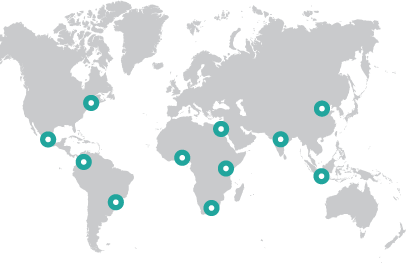
Number of grantees132
Grantee Snapshot
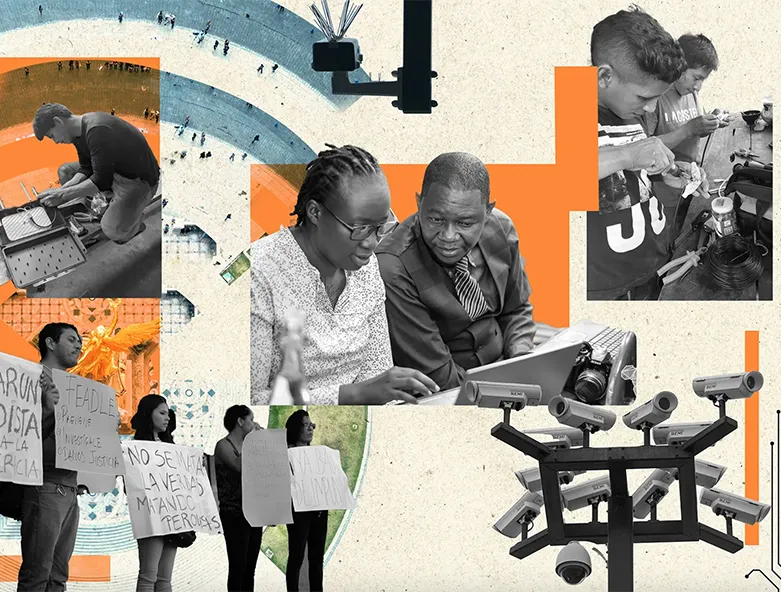
Global Network for Social Justice and Digital Resilience
As technology advances, new digital threats disrupt civil society and social justice organizations. Organizations and advocates in the Global South often lack the resources to respond. Ford launched the Global Network for Social Justice and Digital Resilience to build the technical capacity and digital resilience of frontline organizations across the Global South. The independently governed network supports a cohort of 10 organizations that anticipate risks, respond to crises, and advance the digital inclusion of historically excluded communities. The cohort works to protect activists and civil society organizations from online threats through initiatives such as the Social Media Exchange’s Digital Safety Helpdesk, which provides direct, rapid-response technical assistance to activists, journalists, and human rights defenders when they face safety threats and hacking attempts.
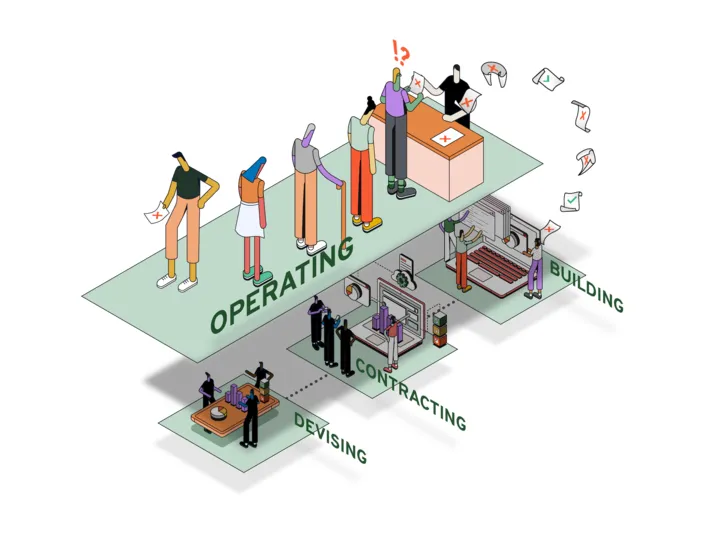
Upturn
Upturn brings together technology policy experts and community advocates to address the ways technology exacerbates long-standing racial and economic inequality. They combine research, advocacy, and technical assistance to address the ways that technology exacerbates long-standing racial and economic inequality. For example, in partnership with Legal Aid of Arkansas and the National Health Law Program, Upturn created the Benefits Tech Advocacy Hub, which enables advocates to challenge exclusionary and faulty technologies that administer public benefits. In doing so, they help eligible recipients of public benefits receive them when they are needed most. The alliance uncovered how states’ use of automated systems denied home care services to up to 66% of eligible participants in at least five states, including many older adults and people with disabilities. Advocates successfully fought for improvements to the technology, resulting in two states halting their use of exclusionary, flawed systems. The Hub continues to provide technical assistance resources that empower local advocates to shape technology from conception to development.